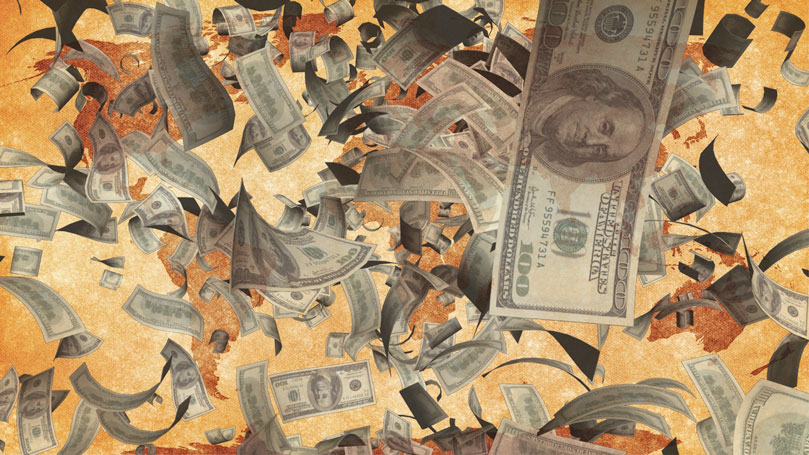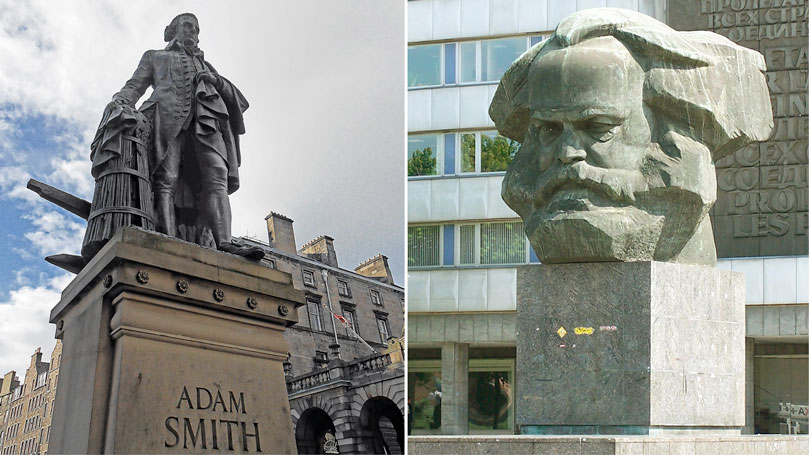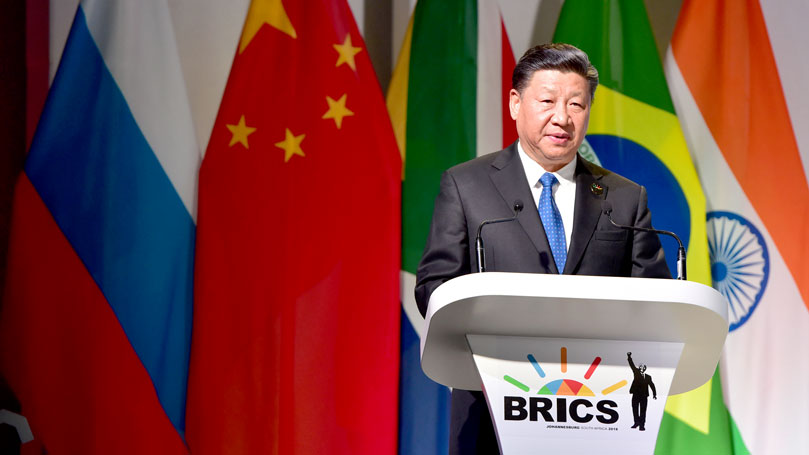
Bourgeois trade theory (e.g. Paul Krugman, who has a Nobel prize on the subject) asserts international trade begins with a demand for a good or service that a nation cannot or desires not to supply for itself.
Marx would probably disagree and emphasize the role of production — including the relations of production and availability of labor, the level of technological development, and what is made available by the natural environment — as essential in determining trade relations between nations. Spoons have been around forever. Cheap, mass produced spoons from a single factory to the whole world, not so. Marx would argue capitalism is not capitalism without capitalist relations of production, i.e. wage laborers producing a profit for business owners. This is the secret world operating behind the scenes as great sums of money fly instantly across the globe in today’s world economy. Marx argued — before Lenin ever wrote his thesis on imperialism — that capitalism inevitably turned into monopoly capitalism. The latter helps to produce trade imbalances between nations. All this hides behind the “money form” of value.
This may sound academic. And indeed, it does reflect a materialist- vs. idealist-colored philosophical debate invading economics. But it is consequential when it comes to defining “fair trade” between countries at very uneven levels of development. “Mutual agreements” between unequal powers can be — as even Warren Buffett notes — coercive, war-like, imperial, and a long way from being mutually beneficial.
Fair trade
The principle of “fair trade” Buffett invokes in the above — “We should be looking to trade with the rest of the world. We should do what we do best and they should do what they do best” — is called “comparative advantage” in economics and originates with classical economist David Ricardo.
Consider two countries. One with a gross domestic product consisting mostly of labor-intensive agriculture and a smaller, but much higher labor-productivity textile industry. Their agriculture is barely more than subsistence, and of little export value, while dollars earned from selling textiles could be invested very productively. Another country has highly automated agriculture, a desire to buy cheap clothes, and a focus on building software. It is not hard to imagine a trade agreement that can be mutually beneficial. However, “comparative advantage” theory measures the “benefit” by the net change in growth in each country due to a more “efficient” allocation of labor and capital toward the most productive sectors. From the standpoint of mainstream — i.e. bourgeois — economists today, efficiency and productivity is, of course, synonymous with the rate of profit generated from given investments in labor and capital.
There is no question that reasonable application of “comparative advantage” math is an important feature of “fair trade” between unequal partners. One of its potentially socialistic virtues might be comparing what nations could “do best” in terms of “socially necessary labor time,” given the right conditions. Marx agreed with classical bourgeois economists Ricardo and Adam Smith that the source of value — generally represented by money — was in the labor process, though he developed the theories of labor-power and surplus value much further. Of course, all this has been cast to the wind by today’s bourgeois economists.

Comparative advantage math can be a useful tool, but is not sufficient to ensure “fair trade.”
In the example above, for instance, suppose the IMF — in an oft-repeated pattern — offers to finance big development loans based on the stream of dollars the first nation will be getting from selling clothes in the second nation’s market. The bank calculates the interest payment load could work if nation one spent the loan on textile- and export-oriented infrastructure. Nation one instead has to spend money on automating agriculture or importing food besides other social problems resulting from dislocation of agriculture labor as employment becomes concentrated in textile production. The remaining assets are sucked up by interest payments. The loans turn into enslavement.
Nation two, in a complementary distortion, lays off all its textile workers, and the gains from trade are invested in financial services, made more immediately profitable by nation one’s huge debt payments. Meanwhile, the textile workers in nation two have been left behind.
Few benefit from the above scenario, but none of it violates bourgeois standards of comparative advantage, as long as profits are being made. Along these lines, consider that Buffet remarks “the more balanced trade is the better … for cocoa to be raised in Ghana, and coffee in Colombia,” and that the U.S. was “good at producing tobacco and cotton 250 years ago, and we traded it.” These, in his view, are good demonstrations of comparative advantage working out well. But what one country “does best” is a question of historical development, a process subject to change.
Therefore, “balanced trade” — measured only by profits and money — is not synonymous with balanced development. How gains from trade are distributed and reinvested, plus converting losers to winners, are the decisive terms of trade that must be considered, in addition to growth from “comparative advantage” math. All sides of development must be considered to make trade fair and prosperous for all. Market operations cannot achieve this without strong, indeed socialistic public regulation and intervention, also known as “industrial policy.”
Tariffs
Tariffs are a tax on imports. They are paid by the consumers of the imports if the importers are monopolistic and therefore have the ability to impose non-competitive prices, which is often the case now in the U.S. They play a variety of roles in the history of trade between nations, depending on the relative economic wants or surpluses of their economies. Their chief purpose historically has been to protect domestic industries from foreign competition, thereby protecting the nation’s independence from possible foreign domination, or even colonization.
U.S. manufacturing at numerous points prior to the Second World War demanded tariffs on foreign steel, iron, aluminum, wool, and other textiles to protect nascent industries from foreign, primarily British, competition. Similar motivations can be found in many developing nations, including socialist countries that seek to protect their independent paths to modernization from being captured by globally dominant corporations and the governments that represent them.
On the imperial side, tariffs have been used by some ruling nations to, in effect, collect rents from colonies. King George III imposed a royal tax — a tariff — on imported tea grown in the British colonies by the farmers there. In return for paying that tax, those in the colonies got nothing beyond the protected “right” to consume their own tea. This was one of the factors which incited the outbreak of the American Revolution in 1776.
Trump’s Mafia-style approach
Trump’s tariffs represent a transition away from a rules-based trade system, governed by some UN bodies as well as the World Trade Organization, World Bank, and International Monetary Fund. The U.S. and some European countries have largely dominated these institutions, particularly those outside of the UN, to the benefit of large U.S.-based transnational corporations and corporate tax evaders. However, with the growing strength of emerging economies within these bodies, most notably China, the U.S.’ ability to set terms has been weakened. Consequently, Trump aims to move toward a system based on mafia-style extortion and direct, unilateral domination.

There is no “protection” the U.S. needs, except, possibly, from blowback against the terms we ourselves set. But Trump is selling the imperialist lie that the U.S. is a victim of “unfair trade practices” other than ones its own billionaires designed. Every manufacturing job lost to foreign investment was initiated by U.S. corporations seeking cheap labor and resources under the protection of U.S. diplomatic and security “services.”
As Dean Baker, a leading progressive economist, writes, “In Trump’s make-believe world countries are ripping us off by selling more to us than they are buying from us. As has been endlessly pointed out, this is like saying a store rips us off because they sell us things without buying anything from us.”
It stands to reason that if U.S. corporations choose to manufacture goods in other countries, it will result in more goods being sold back to the U.S., rather than those goods being sold by the U.S. to other countries.
Baker adds that the U.S. also has some “non-tariff barriers” to trade. “Some countries subsidize their exports, as is the case with our agricultural exports,” he points out, and asserts that “demanding countries pay for our intellectual products … is a massive transfer from other countries to us for literally nothing in return.”
Nonetheless, the accumulation of losers from decades of deregulated automation and globalization has provided Trump with plenty of populist backing to upend the “rules-based” system. Trump is attempting to build his base by fanning the flames of national chauvinism, while adding a consumer tax on imported goods, hoping to plug up a gigantic budget hole created by tax cuts for billionaires. By hitting hard at their U.S. consumer base, he also aims to undercut emerging economies’ growing industries. The exemptions also provide a new way to reward friends and punish enemies.
The Mafia-like version of tariffs will only lead to warfare, from which there will be no gains for U.S. workers, only losses: where brutal tariffs are set and withdrawn on whims; where insults, threats, blandishments, favors, and violence frame any discussion of “mutual benefits” with other countries.
Socialist trade
Socialist principles of trade strongly favor a rules-based system over a chaotic, inflammatory, Mafioso style “system.”
In addition to comparative advantage, socialist trade adds the principles of solidarity to the rules:
Find useful and gainful work for everyone to do. Leave no one behind.
Socialist principles of internationalism champion the world labor federations standing and participating in all the governing bodies of global and regional trade associations. Those who do the work of the world need to be more united.
Socialist principles champion democratic governance seizing control of the “commanding heights” of the global economy, especially energy and the flows of capital, to improve climate control and reduce the chasms of inequality denying prosperity and threatening catastrophes to billions.
It is no accident that socialist-oriented countries like China and Vietnam are among the countries most successful at applying the principles of comparative advantage productively. In each nation, tariffs and protection are linked with industrial and financial policies aimed at achieving the nation’s social and economic goals. These have been focused on modernization and poverty reduction that leaves no one behind.
The opinions of the author do not necessarily reflect the positions of the CPUSA.
Images: 1. world map by mybestart (pxhere.com)/ Money falling by by Venomspartan (deviantart.com). 2. Adam Smith (Wikipedia) / Karl-Marx-Monument in Chemnitz (Wikipedia) 3. Xi Jinping at the 10th BRICS Summit (GovernmentZA on Flickr)


 Join Now
Join Now